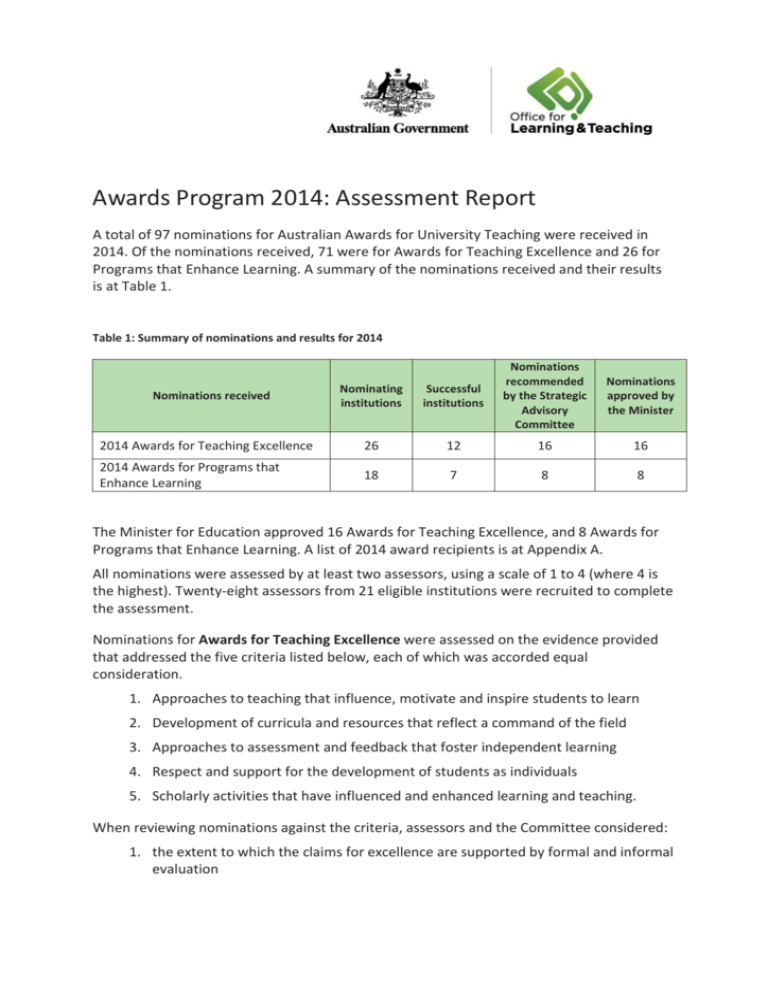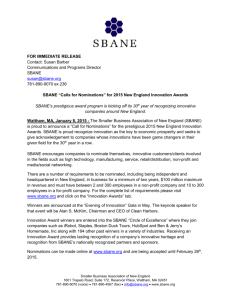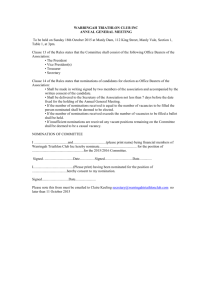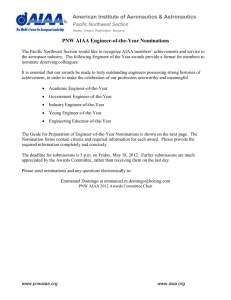Awards Program 2014: Assessment Report
advertisement

Awards Program 2014: Assessment Report A total of 97 nominations for Australian Awards for University Teaching were received in 2014. Of the nominations received, 71 were for Awards for Teaching Excellence and 26 for Programs that Enhance Learning. A summary of the nominations received and their results is at Table 1. Table 1: Summary of nominations and results for 2014 Nominating institutions Successful institutions Nominations recommended by the Strategic Advisory Committee 2014 Awards for Teaching Excellence 26 12 16 16 2014 Awards for Programs that Enhance Learning 18 7 8 8 Nominations received Nominations approved by the Minister The Minister for Education approved 16 Awards for Teaching Excellence, and 8 Awards for Programs that Enhance Learning. A list of 2014 award recipients is at Appendix A. All nominations were assessed by at least two assessors, using a scale of 1 to 4 (where 4 is the highest). Twenty-eight assessors from 21 eligible institutions were recruited to complete the assessment. Nominations for Awards for Teaching Excellence were assessed on the evidence provided that addressed the five criteria listed below, each of which was accorded equal consideration. 1. Approaches to teaching that influence, motivate and inspire students to learn 2. Development of curricula and resources that reflect a command of the field 3. Approaches to assessment and feedback that foster independent learning 4. Respect and support for the development of students as individuals 5. Scholarly activities that have influenced and enhanced learning and teaching. When reviewing nominations against the criteria, assessors and the Committee considered: 1. the extent to which the claims for excellence are supported by formal and informal evaluation 2. the extent of creativity, imagination or innovation, irrespective of whether the approach involves traditional learning environments or technology-based developments 3. information contained in Student Feedback Questionnaires, references and selected teaching materials submitted by the nominee Assessors also considered the contribution to Indigenous education made by nominations for the Neville Bonner Award for Indigenous Education and in the Early Career categories. The career stage of each nominee was considered when assessing criterion five. Nominations for Awards for Programs that Enhance Learning were assessed on evidence provided that addressed the following four criteria, each of which was accorded equal consideration. 1. Distinctiveness, coherence and clarity of purpose 2. Influence on student learning and student engagement 3. Breadth of impact 4. Concern for equity and diversity When reviewing nominations against the criteria, assessors and the Committee considered: 1. evidence of the effectiveness of the program in formal and informal evaluation 2. the degree of creativity, imagination and innovation 3. evidence of the sustained effectiveness of the program General comments on nominations Assessors were invited to complete a survey indicating their view of the quality of the nominations. The overall quality of the nominations was ranked good or excellent by over 67 per cent of the 28 assessors who completed an evaluation of the assessment process. Of assessors surveyed, 74 per cent agreed that the applicants understood and met the selection criteria in the nominations. The assessors commented that videos generally gave them more in depth knowledge of the nomination. Content, rather than quality, of videos was considered most important. Videos should not be provided as a marketing exercise. Nominations could be improved by: Evidence x x x x providing evidence beyond the normal pedagogical expectations, preferably with sustainable and nationally recognised impacts validating the data by using a variety of sources, which might include qualitative, quantitative, internal and external sources providing a broader range of evidence, with enhanced quality, not only within the nominations but also in the supporting documentation strengthening scholarly base by using literature and/or pedagogy and addressing all criterion with details and fewer discrepancies External review x x receiving more institutional recognition and support, particularly support by referees to show impacts beyond own institutions and faculties including review or statements from peers, critical friends or colleagues outside the home institutions Impact x x x extending innovative ideas from own discipline to a broader context of educational practice, with supportive evidence increased attention on student learning and graduate attributes better linking the supplementary evidence to the impact on student learning in the written statement Appendix A 2014 Awards for Programs that Enhance Learning Widening Participation x Widening Tertiary Participation for Students from Pasifika Communities, Griffith University Educational Partnerships and Collaborations with Other Organisations x Indigenous Cultures and Health, Curtin University The First-Year Experience x First Year Advisor Network, Murdoch University Innovation in Curricula, Learning and Teaching x x UNSW Medicine Program, The University of New South Wales Interprofessional Learning Modules: 'Learning Together to Work Together', The University of Newcastle Postgraduate Education x University of Queensland Business School MBA, The University of Queensland Services Supporting Student Learning x Griffith English Language Enhancement Strategy, Griffith University Global citizenship and internationalisation x School of Community Health Overseas Workplace-learning Program, Charles Sturt University 2014 Awards for Teaching Excellence Biological Sciences, Health and Related Studies x x x Associate Professor Michael Calver, Murdoch University Dr Louise Lutze-Mann, The University of New South Wales Dr Susan Rowland, The University of Queensland Early Career x x x Dr Leopold Bayerlein, University of New England Mr Chris Browne, The Australian National University Dr Danny Liu, The University of Sydney Humanities and the Arts x x Dr Brydie-Leigh Bartleet, Griffith University Dr Janette McWilliam, The University of Queensland Law, Economics, Business and Related Studies x x x Professor Stephen Colbran, Central Queensland University Associate Professor Rachael Field, Queensland University of Technology Dr Johanna Macneil, The University of Newcastle Physical Sciences and Related Studies x x x Associate Professor Kieran Lim, Deakin University Associate Professor Dann Mallet, Queensland University of Technology Dr Chris Tisdell, The University of New South Wales Social Sciences x x Associate Professor Tonia Gray, University of Western Sydney Associate Professor Leonie Rowan, Griffith University






